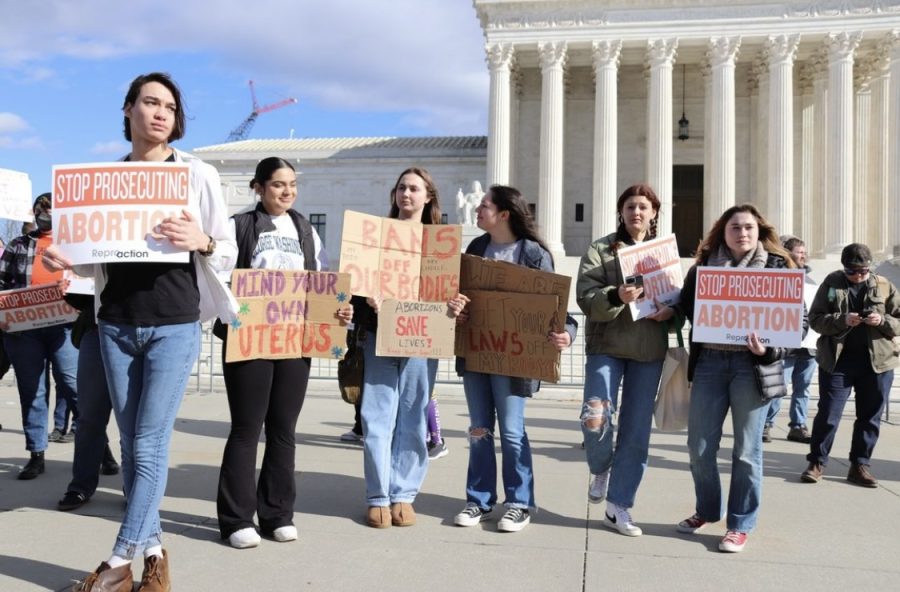The Necessity of Fighting For Abortion Rights in a Post-Roe
On Friday, Jan. 20, thousands of pro-life activists gathered in Washington, D.C. for the March for Life protest at the National Mall. The March for Life rally, held since 1974, protests Roe v. Wade, a Supreme Court case that provided federal protection for the right to choose abortion. The recent overturning of Roe v. Wade allows states to pass laws regarding abortion, with regulations differing from state to state. This year, the March for Life rally celebrated the overturning of Roe v. Wade and discussed consolidating various pro-life groups to push for stricter abortion policies. This rally also promoted youth involvement in the pro-life movement and expressed hope for the younger generation to be more involved.
While anti-abortion activists are pleased with the overturning of Roe v. Wade, there has been political controversy surrounding the decision. Many Republican politicians are reflecting on what it means to be pro-life and some are encouraging restrictive measures on abortion. Other Republicans, however, are concerned with how these measures affect the party’s performance. Former President Donald Trump appears to be concerned with the latter, as he previously blamed the debate on abortion for Republicans’ poor performance in the midterms and is now distancing himself from the anti-abortion movement.
The addition of younger voters who support abortions and the resurgence of individuals who participated in the Women’s March the Sunday after the overturning of Roe v. Wade has further complicated the issue for pro-life politicians. The anti-abortion movement has made it clear through the March for Life that it is not satisfied with the overturning of Roe v. Wade by implementing more stringent policies like “restrictions on medication abortion, protections for so-called crisis pregnancy centers that discourage women from having abortions, and promises of fiercely anti-abortion appointees to run the Justice Department and the Food and Drug Administration.”
I believe that access to abortion is healthcare and that the line should be drawn between reproductive freedoms and religiously influenced ideas. Unfortunately, the overturning of Roe v. Wade has made things more complicated and even dangerous for many women who need an abortion. Currently, abortions are not an option in at least 13 states, and many others have stringent laws, including gestational limits and restrictions on state funds.
For women in states where abortion is illegal, there is a significant financial burden in traveling to another state for an abortion. According to the New York Times, there are “thousands of dollars on added costs beyond the procedure itself, including flights, hotels, child care, food and gas.” Furthermore, “about half of the women who have abortions are living below the poverty line.” In addition, many states do not offer funds to cover procedure costs, ranging from about $500 for first-trimester procedures to over $2000 for women in their second trimester. Calls to abortion funds provide financial resources, transportation and other forms of assistance have increased exponentially in recent years. Many of these organizations, often composed of volunteers, do not have enough funds to help everyone.
The limitation of access to abortion can significantly affect maternal health. Individuals who are denied abortions are more likely “to stay in contact with violent partners and to have trouble affording basic living expenses” and have children that are “more likely to live below the federal poverty line.” There is also the danger of back-alley abortions or other unsafe methods to terminate pregnancies for individuals who are desperate for the procedure and feel they have no other options. People who are denied abortions can additionally face mental health issues and distress. Overall, every individual’s situation differs, and the reason they choose to have an abortion also differs. Taking away federal protection on abortion causes more harm and confusion.
While many individuals in the anti-abortion movement cite religious reasons for opposing abortion access, a line should be drawn between individuals’ reproductive freedoms and religious beliefs. The imposition of these beliefs is unethical. People should be able to make their own choice of whether to receive an abortion or not. The debate over when life begins has multiple scientific, philosophical, societal and ethical perspectives. Limiting abortion access and putting stricter measures on abortions cause more harm to individuals and society. Regardless of laws, abortions will occur. Providing federal protection over this choice and making other aspects of healthcare easier, such as financial help for medical costs, birth control access and sex education, as well as information promotion, would greatly benefit and inform individuals making these decisions.
Saisha Islam, FCRH ’25, is a biology major from New York, N.Y.

Saisha Islam is a senior from the Bronx, N.Y., who is majoring in biological sciences and minoring in English. She first joined The Fordham Ram as a contributing...











































































































































































































Eric Toddy FCRH '18 • Feb 5, 2023 at 1:09 am
Feel free to transfer